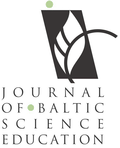GENERAL PHYSICS AT THE UPPER SECONDARY EDUCATION LEVEL
| Title | GENERAL PHYSICS AT THE UPPER SECONDARY EDUCATION LEVEL |
| Publication Type | Journal Article |
| Year of Publication | 2003 |
| Authors | Broks, A |
| Journal | Journal of Baltic Science Education |
| Volume | 2 |
| Issue | 2 |
| Start Page | 28 - 37 |
| Date Published | March/2003 |
| Type of Article | Original article |
| ISSN | 1648-3898 |
| Keywords | didactics, general education, physics education, research and development of education, upper secondary education |
| Abstract | As an attempt to fight the crisis in natural sciences education author’s concept and the main structure of general physics subject at the upper secondary education level is reported. Systems approach had been adopted and philosophical as well as psychological background was prepared to develop a modern structure and context of the subject when starting the upper secondary (senior high school) education in physics. Diverse macro, micro and mega world bodies and mediums in motion – observations, physical and mathematical modeling of motion for understanding of the scientific method and main achievements in physics research and engineering makes a general guideline of reported design and practical realization of subject. First, let us make the note that this paper reports only the main principles of author’s ideology as well as only the main structure of general physics subject at upper secondary education level. In details such projects usually are heavily authorized – many details of subject realization are very personal and not very interesting for general discussion. So, excuse me, dear readers, for details which are not described here fully enough. We need direct in-service meetings and special publications for more detailed description of the proposed subject structure and its practical realization. Secondly, author would like to turn special attention to the fact that we need seriously to think about the terminology of physics education as well as science and engineering for international cooperation when using English words and language structures. To express author’s thoughts in definite logical structures for foreign people, who do not know Latvian language, International English Latvian version is used. Why? Our thoughts in our native languages very often are impossible to express precisely in native English. The logical structures are typical for each native language and we need to work very correctly in our mutual interaction in order not to loose sense of native logical structures, when changing languages. By the way – what does "native English" mean? British or American English? Billions of people today all around the world use and develop International English – so did also the author of this report, expressing his Latvian language based thoughts – logical structures in English for readers with different native languages. International English gives us wide possibilities to enrich our native languages and develop our national systems of education and professional terminology without producing formal senseless mixtures of words – widespread loosing of precise thought structures based on native languages. |
| URL | http://oaji.net/articles/2017/987-1503928685.pdf |
| Refereed Designation | Refereed |
| Full Text |
